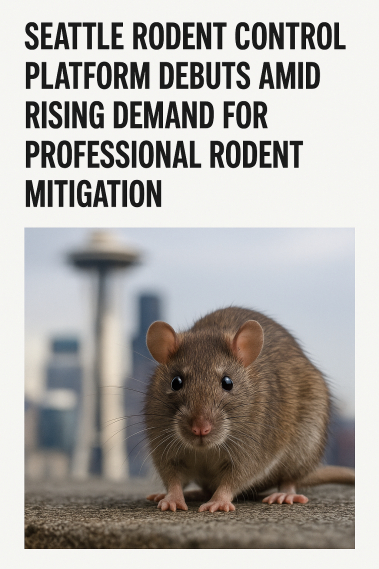Seattle Rodent Control Platform Debuts Amid Rising Demand for Professional Rodent Mitigation
Seattle Rodent Control is a new online platform designed to connect residents and businesses with licensed pest control professionals. Focused on eco-friendly and effective rodent mitigation, it offers access to trusted services, education, and innovative solutions tailored to Seattle's unique urban challenges.

Seattle has introduced a comprehensive online platform, Seattle Rodent Control, to address the city's escalating rodent issues. This initiative connects residents, business owners, and property managers with licensed pest management professionals, emphasizing environmentally responsible and effective solutions.
Urban Challenges Fueling the Need for Professional Rodent Control
Seattle's unique combination of dense urban development, aging infrastructure, and a moist climate has created ideal conditions for rodent populations to thrive. Factors such as rapid construction, inconsistent waste management, and year-round breeding cycles have led to increased sightings of Norway rats and roof rats, particularly in areas like alleys, storm drains, and waterfront properties.
These rodents pose significant health risks, including the transmission of diseases like Salmonella and Leptospirosis, and can cause structural damage by gnawing on electrical wiring and insulation. The growing concern among Seattle's residents and businesses has highlighted the necessity for professional, sustainable rodent mitigation strategies.
Introducing Seattle Rodent Control: A Centralized Solution
The newly launched Seattle Rodent Control platform serves as a centralized directory, assisting users in locating qualified, licensed, and insured rodent control providers across the greater Seattle area. Each listed company adheres to Integrated Pest Management (IPM) principles, focusing on long-term prevention and minimizing environmental impact.
Lisa Ng, public affairs coordinator for Seattle Rodent Control, emphasizes the platform's role in simplifying the process of finding trained professionals who understand the specific conditions contributing to pest issues in the Puget Sound area.
Embracing Eco-Friendly and Innovative Control Methods
Seattle's approach to rodent control is evolving, with a shift towards environmentally friendly and humane methods. One notable innovation is the use of carbon dioxide (CO₂) treatments to manage rodent populations in public parks. This method involves injecting CO₂ into rodent burrows, effectively suffocating the rodents without the use of harmful poisons. The technique has been successfully implemented in over 40 parks, including Cal Anderson and Woodland Park, reducing the risk to non-target wildlife and the environment.
Additionally, local pest control companies are exploring non-toxic alternatives such as rodent birth control. This method renders rats infertile, offering a long-term solution to population control without the use of lethal measures. Such innovative approaches align with the city's commitment to sustainable and humane pest management practices.
Empowering Residents Through Education and Resources
Beyond connecting users with professional services, the Seattle Rodent Control platform provides educational materials to help residents identify early signs of rodent infestations, such as droppings, gnaw marks, and nesting debris. Guidance is also offered on preventive measures, including sealing entry points, maintaining cleanliness, and monitoring for ongoing activity.
By promoting awareness and proactive measures, the platform empowers the community to take an active role in mitigating rodent issues, complementing the efforts of professional pest control services.
A Model for Urban Pest Management
Seattle's comprehensive approach to rodent control, combining professional services, innovative methods, and community education, serves as a model for other urban areas facing similar challenges. The Seattle Rodent Control platform exemplifies how cities can effectively address pest issues through collaboration, sustainability, and a commitment to public health and environmental stewardship.













